Hostile takeover: Turning Point USA and the remaking of Arizona's Republican Party
- Oops!Something went wrong.Please try again later.
- Oops!Something went wrong.Please try again later.
- Oops!Something went wrong.Please try again later.
The buzz among attendees at the 2019 meeting of the Arizona Republican Party was that the machines being used to vote for party chair couldn’t be trusted. And that, instead, everyone should state their preference out loud in a voice vote.
At the end of that noisy, chaotic process, Kelli Ward, a former U.S. Senate candidate, who twice couldn’t escape the Republican primary, became leader of the party that she felt had shunned her.
Helping Ward get there, The Arizona Republic would report weeks after her election, were two people with connections to Turning Point, the umbrella name given to a group of organizations whose clout within the party has grown in recent years.
The Turning Point employees who served as unofficial advisers to Ward were Tyler Bowyer and Jake Hoffman.
Hoffman was the former communications and media director for Turning Point USA. He also ran a company called Rally Forge that was paid more than $1 million by Turning Point USA. In 2020, Facebook banned Rally Forge from its site because its investigation found the company created fake profiles to comment on news stories ahead of the election.
Bowyer has served as the chief operating officer for both the nonprofit charity, Turning Point USA, and its related advocacy group, Turning Point Action. The Republic reported that Bowyer worked on his own time, not Turning Point’s.
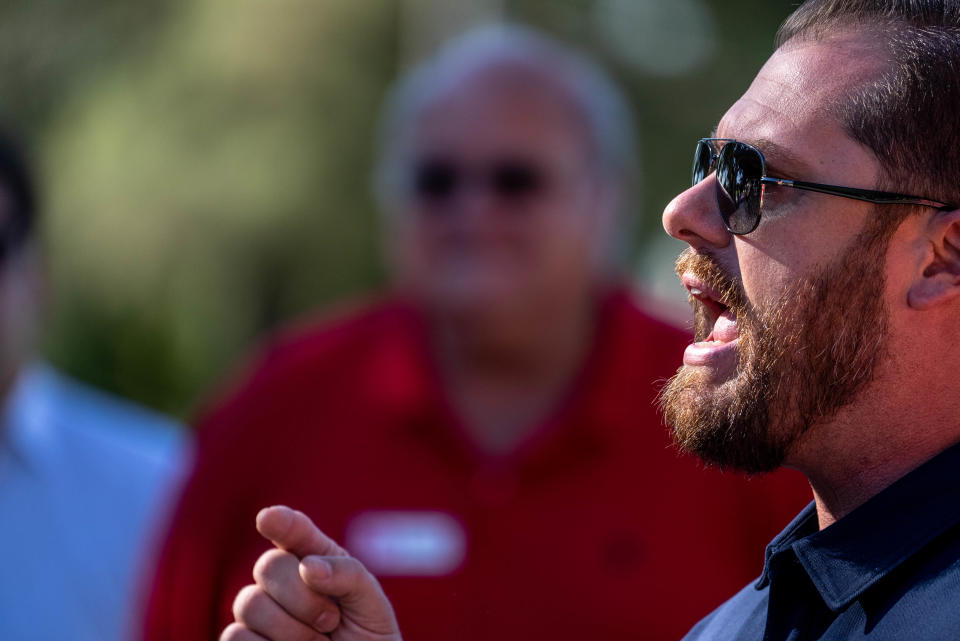
In an interview this year, Bowyer declined to detail what he did to help Ward.
Ward’s election as chair of the Arizona Republican Party would prove a consequential choice. It deepened a seismic divide within the party. On one side stood the establishment members who had once supported the likes of former U.S. Sens. John McCain and Jon Kyl. On the other were those who pledged loyalty to then-President Donald Trump.
Under Ward’s leadership, the party would take a hard right turn and upend convention.
It would take sides within primaries, tilting toward candidates who espoused conspiracies, including the myth of a stolen 2020 election.
It would censure establishment Republican officeholders and figures, including McCain, former U.S. Sen. Jeff Flake, Gov. Doug Ducey and Arizona House Speaker Rusty Bowers.
It would adopt a take-no-prisoners attitude in online postings and in-person deeds, leaving no quarter for moderates whom it would describe as Republicans In Name Only, or RINOs.
And throughout this transformation were the fingerprints of Turning Point.
The ground troops of the Arizona Republican Party, its precinct committeemen, would be seeded with newcomers, some of whom told their district chair they filled out their paperwork at Turning Point events.
The state’s once-dormant Young Republican chapter would be revived, with its leadership team filled with people with ties to Turning Point.
Bowyer, Hoffman and Ward would earn one of the highest honors for party loyalists. All three would appear on the 2020 general election ballot as part of the list of electors who would cast Arizona’s votes in the Electoral College for Trump should he win.
2022 mideterms: Democrats hoped Latinos would turn GOP states 'purple.' That may not be the case anymore.
Even after Trump lost Arizona, the three would join their fellow electors in falsely declaring themselves the state’s official electors and sending paperwork signifying as much to Congress in an apparent attempt to delay or upend the victory of President Joe Biden. That action has come under investigation by a federal grand jury.
Ward did not respond to an interview request sent to a party spokesperson.
The transformation of the Arizona Republican Party has left some longtime donors and operatives out in the cold. One, who faced a lawsuit from within the party to keep her from serving as a precinct committeeman, described herself as “politically homeless.”
Sandra Dowling, a lifelong Republican who ran Maricopa County’s school system for decades, said she used to consider herself a staunch conservative. But somehow she finds herself unmoored in a party that has not just tilted rightward, but has encouraged ideas about election fraud and has praised Russian dictator Vladimir Putin.
“Those of us who were part of that conservative group,” she said, “the party has moved so far to the right that they have left us behind.”
Kathy Petsas, who has served the Arizona Republican Party as a precinct committeeman for decades, said in district meetings she hears the parroting of messages she believes come from Turning Point events.
“What Turning Point wanted is to dilute the party,” she said, “to get rid of, what I think, are critical thinkers. They don’t want dissent away from their values and mission.”
Many longtime Republicans held their tongue as their party fractured in the Trump era, hoping it would eventually drift back to an institution they recognized. But, with the seeming takeover by the Turning Point crowd complete, they feel unable to stay silent.
Others contacted by The Republic for this story refused to speak on the record, either still hoping for eventual party unity, or fearful of retaliation and reputational attacks.
Cory Mishkin, a lifelong Republican whose family knew Barry Goldwater and McCain, said he didn’t recognize this version of the Arizona Republican Party, one that he said seems thrilled at shedding its legacy.
Mishkin, who also faced a lawsuit challenging his precinct committee nomination forms, said it appears that Bowyer and the Turning Point crowd are playing a long-range strategic game: turn Arizona a deep shade of red, excise the old guard Republicans and set a template that can be repeated nationally, he said.
“They need to prove they can take Arizona politics over,” he said, “and they can show they made their stamp on Arizona and made it work in Arizona and delivered Arizona, so they can roll that out in other places.”
You've got mail voting?: Donald Trump and other election deniers target mail balloting system
A belief that voting was rigged
The way Kathy Petsas remembers it, the 2019 state party convention was going along smoothly until someone suggested doing away with electronic voting for the party leadership roles and instead go with a voice vote.
With the electronic system, Petsas said, eligible voters could leave the marathon meeting, but still check in and vote remotely and securely.
But, Petsas said, word started spreading among attendees that the Simply Voting system was rigged.
A Republican from Tempe, Joe Neglia, who on his website described himself as a self-studied expert in Robert’s Rules of Order, made a motion for a voice vote.
The Arizona Republican Party had hired its own parliamentarian, a real estate agent from Avondale named Al Gage. In an interview, Gage said Neglia’s motion was allowed in the bylaws. And although he sensed pressure in the room to declare it invalid, he ruled it in order.
Those wishing a voice vote were asked to stand. If 20% did, the motion would carry. Gage said he estimated 40% of the room stood in approval.
Mishkin said he remembered going up to Bowyer as the voice vote motion was being made. Mishkin said he asked Bowyer what was happening and why.
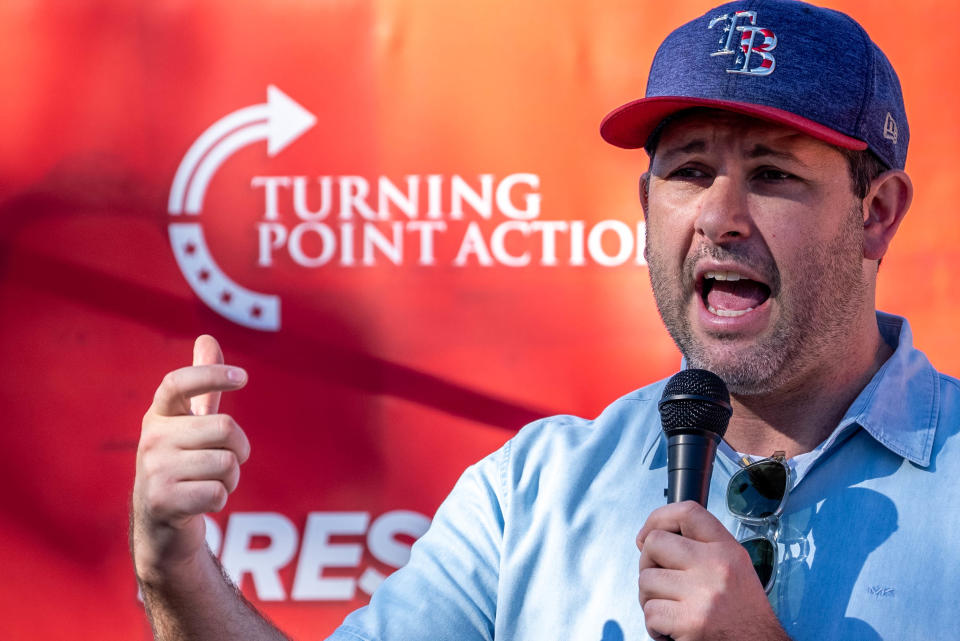
Bowyer looked at him and dismissed him because he represented a legislative district that was home to many establishment Republicans. “You’re LD28,” Bowyer said, according to Mishkin. “We’re not going to listen to you.”
There were four candidates for chair. The sitting district chair was Jonathan Lines of Yuma. But he was facing criticism from the Patriot wing of the party who considered him a weak leader, who oversaw losses in statewide offices, allowed Arizona’s congressional delegation to turn majority Democrat, and who saw a U.S. Senate seat flip to a Democrat.
A group of college Republicans from Arizona State University protested against Lines outside the church where the statutory meeting was held. Their signs said, among other slogans: “No confidence in Lines” and “Lines = Backstabber.”
The favored candidate of the insurgent Republicans was Ward.
She was a lightning rod. As a state lawmaker, she had earned the nickname “Chemtrail Kelli,” for suggesting a legislative hearing be held to determine if chemicals were being emitted from airplane exhaust.
She challenged McCain for his U.S. Senate seat in 2016, campaigning on the notion that the then 79-year-old former prisoner of war was too old for the job and would deteriorate soon.
She ran for a U.S. Senate seat again in 2018 against Martha McSally, then a U.S. representative. During that campaign, McCain announced he was halting treatment for the aggressive form of brain cancer he was battling. Ward suggested McCain timed that news to upstage her announcement of a tour by bus of Arizona.
Under the rules for a voice vote, Petsas said, only those in attendance could vote. And they had to do so in groups around their district chair.
For Petsas’ district, it was relatively simple. “Our district has never given a single vote to Kelli Ward,” she said. All but one of the 112 committee persons voted for Lines. The remaining voted for another challenger.
But for most other districts, the voice vote amounted to various levels of controlled chaos. Groups of people stood around someone who tried to keep track of who had voted and who they had voted for. And, they had to state their preference out loud.
“True conservatives were doing away with people’s secret ballot,” Petsas said, noting the irony.
When it was a secret vote, Petsas thought Lines had a slim chance of winning. But with a voice vote “who knows what could happen,” she said. Petsas said that some of the district chairs “were getting all fired up.”
As chair of Maricopa County, Rae Chornenky was tasked with writing down the tally for each of the legislative districts in the metro Phoenix area as they were called out orally. Chornenky recalled being onstage behind a podium, writing down the numbers on a sheet of paper.
In front of her, she said, stood Hoffman, watching her with his arms crossed. At one point, he called up two women to the stage and directed them to stand on either side of Chornenky and watch her write down the numbers.
Chornenky said she started preparing a second column of numbers when suddenly Hoffman “got ballistic.”
He started shouting something along the lines of “She’s writing something different,” and “She’s doing something,” Chornenky said.
In response, Chornenky told Hoffman to “stay quiet.” She told Hoffman and the two women that they all “are going to back up a little.”
Chornenky said Hoffman was being authoritative and telling her what to do and she wasn’t sure why. “I didn’t understand why he was in charge of everything,” she said.
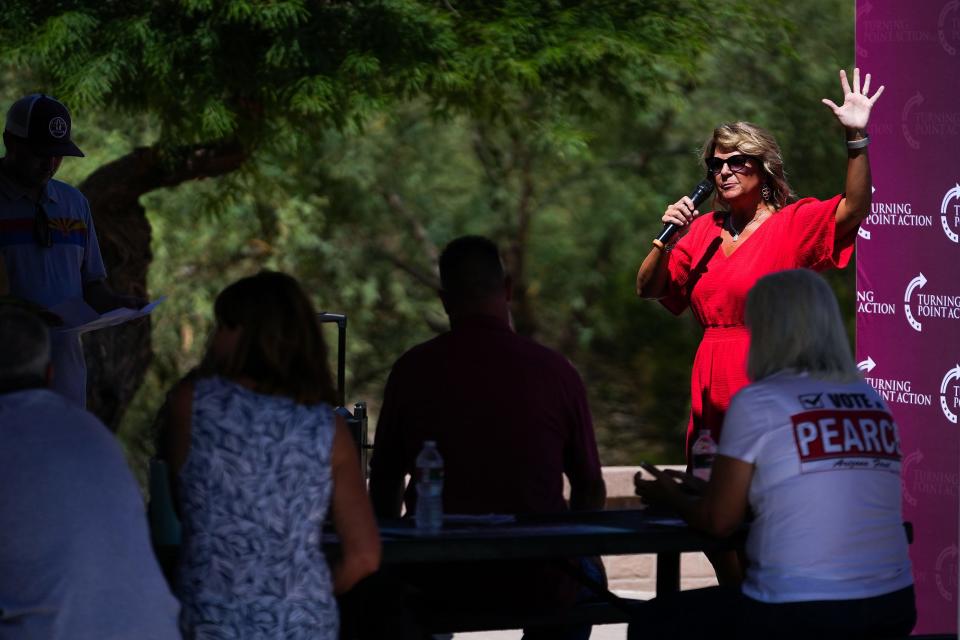
Hoffman did not return a request for comment sent through a public relations person.
With the call for the voice vote, Ward was able to harness the energy in the room, created with her Trump-like speech to attendees.
“Mark my words,” she said, during her speech, in which she pledged to invigorate the party. “These next two years will be the most important two years for this great state of Arizona.”
By contrast, Lines’ speech did not leave the hall energized.
Chornenky said there was another factor at play. Having people state their vote out loud altered the results. With the prevailing atmosphere in the room, people didn’t feel comfortable publicly backing Ward’s opponent, she said.
“Many of the people there realized that if they publicly didn’t support that person and the person won, they’d have a rough road to hoe,” she said.
It was a Catch-22: People didn’t feel comfortable not voting for Ward, fearing retaliation if she won. And, riding the feeling, Chornenky said, Ward pulled off the victory.
Winning at any cost
At the next convention, in 2020, Bowyer ran to be national committeeman.
It’s a post that typically goes to a veteran party operative with the time and means to attend the quarterly national meetings.
But Bowyer, who made a six-figure salary for his work with Turning Point USA and Turning Point Action, put on a full-court press for the job.
The blog Seeing Red AZ reported that in the days before the meeting, Bowyer sent a copy of “Triggered,” a book authored by Donald Trump Jr., to every voting delegate.
Bowyer easily bested his main rival for the job, Robert Graham, the former Arizona Republican Party chair.
Bowyer, at an August 2022 Turning Point Action rally, told the crowd he was one of the youngest people on the Republican National Committee. He also said he was one of the most conservative. "Not everybody likes me over there," he said, "They're going to learn to like it."
The 2020 election would see a Democratic nominee for president, Joe Biden, carry the state for the first time since 1996. It also saw the second straight loss of a U.S. Senate seat to a Democrat.
But, to Ward, those results were wrong. She would become one of the chief proponents preaching that the 2020 election in Arizona was rigged. Those same false claims would be amplified by Charlie Kirk, the founder of Turning Point, on his podcast and radio show.
The Arizona Republican Party would file legal action against the Maricopa County Board of Supervisors. Ward would also be involved in lawsuits against Gov. Doug Ducey and Vice President Mike Pence.
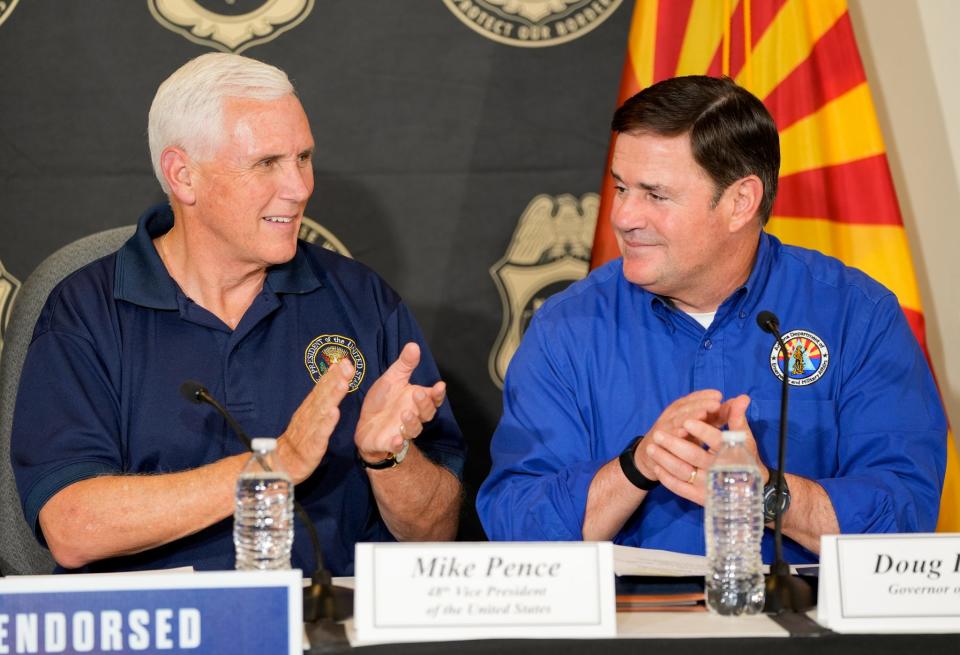
The lawsuit against Ducey would be filed on behalf of the electors who appeared on the ballot and would have cast the state's Electoral College votes for Trump had he carried Arizona. Since the electors were listed alphabetically, the case would be captioned Bowyer v. Ducey.
Ward had convened the state's would-be Republican electors, who included Bowyer and Hoffman, at party headquarters in December 2020 to certify themselves as the state's official Electoral College votes. The documents with that false assertion were sent to Congress.
Sending the alternate slate of electors was part of an overall scheme that, according to congressional testimony, was meant to give Vice President Mike Pence an excuse to either delay or upend the election results, paving a path for Trump to claim victory.
Pence refused to go along with the scheme on Jan. 6, 2021, enraging supporters of Trump who had left a speech of his and marched to the U.S. Capitol. Rioters breached the buildings, sending members of Congress scurrying to safety and delaying the official certification of the election results for several hours.
A few weeks later, Arizona Republicans were set to meet at Dream City Church to choose their party chair.
Sergio Arellano, an Army veteran from Tucson, thought he could heal the fracture between the party's establishment wing and its Patriot or Trump-affiliated wing.
"I'm a party guy," Arellano said. "I'm not a one group or another guy."
Arellano had toyed with running for party chair in 2019, but eventually backed Ward. He said he was told by Bowyer that he would be considered for an official position in the party, perhaps executive director. As it would happen, Arellano was passed over for such a position.
Arellano thought it odd that an outside group like Turning Point would concern itself with who would be party chair. "You never see that," he said. "Traditionally, there hasn't been involvement at that level."
Arellano said that he had a friendly relationship with Ward once she took over the party in 2019 and he continued as a volunteer liaison to the Latino community.
That is, he said, "until I decided to run against her."
Republican CD-9 candidate: 'Ward is a liar and a cheat'
The 2021 statutory meeting of the Arizona Republican Party would not use electronic ballots at all. It would use paper ballots, run through machine tabulators on loan from rural Gila County.
Under the bylaws of the party, a candidate needed to win with a majority of the vote.
After the first round of voting, Ward had 46% of the vote. Arellano had 26%, and a third candidate, Bob Lettieri, had 24%. A fourth candidate, Ann Niemann, garnered 4%. Ward and Arellano would advance to a runoff.
Lettieri announced to the crowd, according to Arellano, that "all my votes should go to Sergio." To Arellano's mind, that combined support would easily best Ward.
But the final tally showed Ward winning 52% to 48%, a difference of 42 votes.
After the results were announced, Arellano joined Ward onstage and made a call for unity, something he would later regret.
"Looking back, I should have stood firm and not conceded and asked for a recount that day," Arellano said during an October interview. "It would have eliminated a lot of the troubles."
Bill Beard, a state committeeman, had been asked by Arellano to monitor the vote counting.
Bowyer, who presided over the meeting, told Beard and the other observers for the various candidates to wait behind the stage. Beard said he would later find that the tabulation was taking place in a storage room at the other end of the venue.
Rather than being able to witness the tabulation, Beard said Bowyer came to them backstage with a sheet of paper that listed the results.
Beard said not being able to be in the counting room was a violation of protocol.
“Under Arizona law, the political parties have the oversight of the (election) process,” he said. “We are the eyes and ears of the public and the public is to be there at every step of the process.”
In an email to Ward and other state Republican Party officials in the days after the election, Beard said he noted “irregularities, inconsistencies and errors” that led him to ask for a recount and audit of the election.
Beard’s main concern, he said during an October phone interview from his Tucson home, was that boxes of blank ballots were left unsecured on the side of the stage. Further, he said, those in charge of handing out ballots were not verifying credentials. He said that ballots were being handed out “indiscriminately” with people getting the wrong ballots or, for those holding proxies, the wrong number of ballots.
Beard emphasized that his beef was not with party leadership or Bowyer. He has long advocated for election integrity and he was merely advocating for following proper procedure.
The race for party chair was not the only one on the ballot. Members also chose among candidates to round out the party's executive team and for members-at-large for each of the state's congressional districts.
Among the candidates for member-at-large for Congressional District 8 was Dowling, the former longtime Maricopa County schools chief. Dowling left the convention before the results were announced because her ride was leaving.
“My phone started blowing up,” she said. The messages told her that she had won.
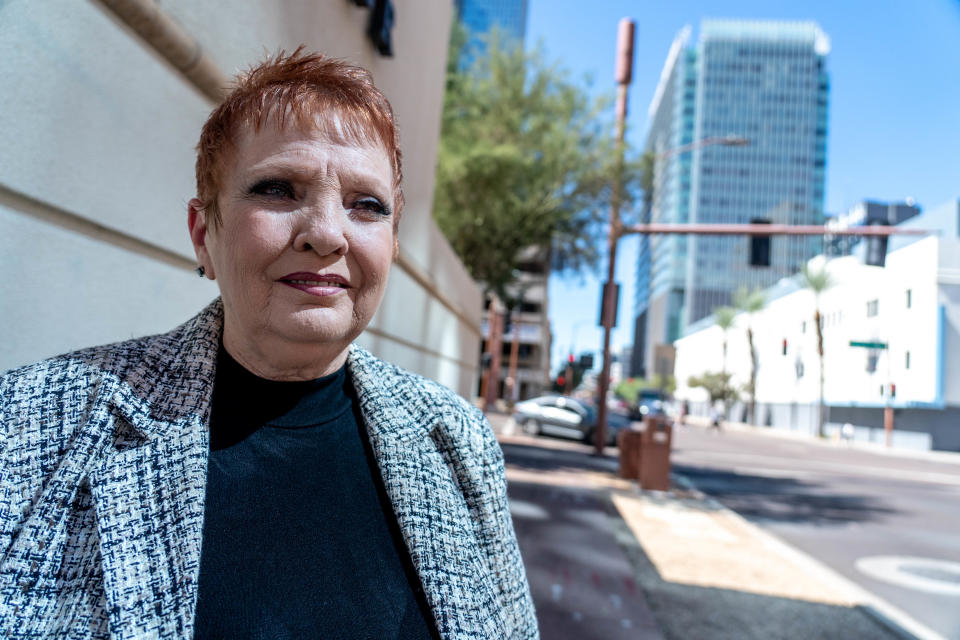
But Ward later announced that the result was wrong and Dowling had lost. The other losing candidate in her race was Chornenky.
When she heard that news, Dowling called Bowyer. “I will tell you I was not nice,” she said. “My Marine Corps background came out.”
Dowling said she “went nuts” on the call, including using some choice words. Bowyer, she said, responded in kind.
“You cheated,” Dowling said she told Bowyer. “You know you cheated.”
Beard and Dowling filed suit against the party. But the courts decided it was an internal party issue.
Beard said he did get to count the votes in his race after reaching an agreement with the attorneys for the Republican Party. The result: He lost by three votes. But, there were also three ballots missing from the reported total tabulated.
2022 midterms: Roe is gone, student debt is up, young people are mad. But will they vote in midterms?
They were allowed to see the ballots for chair, but not count them.
Dowling, who ran unsuccessfully in for Congress in 2022 out of the reconfigured District 9, remains convinced Ward was not legitimately elected. And doesn’t mince words.
“Kelli Ward,” she said, “is a liar and a cheat.”
Arellano said he's not sure what happened in his race. "I chalk it up to whatever they did in the back of the room," he said.
Arellano knows he would have run the party differently had he been elected in 2021. For example, he would not have taken sides in the 2022 Republican primaries, letting his party's candidates duke it out.
"We have seen Tyler (Bowyer) and Kelli (Ward) and that crew play and meddle in primaries," Arellano said.
That wasn't right, Arellano said. "We don’t pick winners and losers," he said of the party's role. "It's not fair."
In the 2022 cycle, Ward sent tweets that hinted or outright supported certain candidates, including gubernatorial candidate Kari Lake.
Though she denied endorsing candidates, she did send out tweets that included the hashtag #VoteFarnsworth, a reference to state legislative candidate David Farnsworth. She referred to his primary opponent, state House Speaker Rusty Bowers, as "Rusty Bowels."
The Twitter feeds of Tyler Bowyer and the organization he helps lead, Turning Point Action, also piled on Bowers and supported Lake.
The Republic has confirmed that Lake's daughter was hired by Turning Point in November 2021.
Additionally, Rae'Lee Klein, Charlie Kirk's administrator at Turning Point USA has a second job as deputy field director for the Lake campaign. She emceed a Lake campaign event Tuesday night in Chandler,
TPUSA and Kari Lake: Democratic group files IRS complaint against Turning Point USA over ties to Kari Lake's campaign
Arellano said he supports the stated mission of Turning Point USA: educating college students about conservative values. He said he didn't want to disparage that group at all.
He said it was difficult to know whether Bowyer was acting as the state's national party committeeman, a top figure at Turning Point Action, or himself.
"It's hard to differentiate where one begins and one stops," he said.
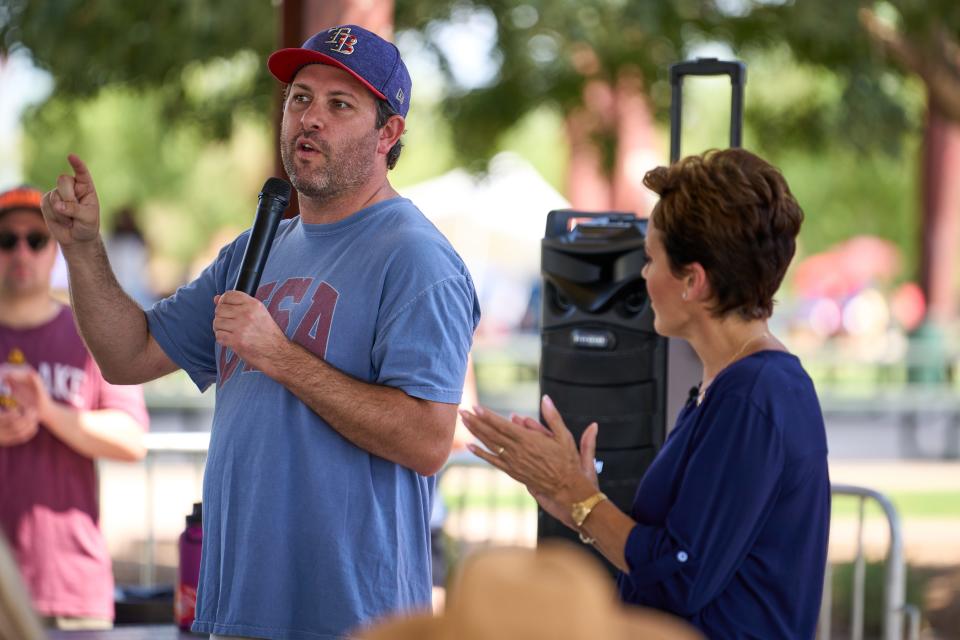
The grunt soldiers of the party
In May 2021, the Arizona Republican Party revived what had been a dormant unit: the Arizona Young Republicans, the state chapter of the Young Republican National Federation.
Photos of a mixer show that speakers at its first event included Ward, Bowyer and Austin Smith, a Turning Point executive who would become the chair of the group.
Four of the five remaining executive positions would also be filled by people who had been employed by Turning Point.
One of them was Shialee Grooman, who has described herself on LinkedIn as a former field operations manager for Turning Point USA. Grooman also worked for the Arizona Republican Party under Ward.
While at Turning Point in 2018, Grooman addressed tweets unearthed by Huffington Post from her high school days that had her relishing in racist and homophobic humor. The Huffington Post story listed Grooman among Turning Point employees who had posted racist jokes or comments on Twitter.
Another of the executives, Connor Clegg, was impeached as student body president of Texas State University after some of his Instagram posts from his high school years surfaced. One post showed a photo of nuns and the comment "holybooty," among others; another showed two Asian men and the hashtags "#kimjongil" and "#pearlharborwasbad. He started working for Turning Point in 2018, according to his online biography, which would have been the same year he graduated from college.
Another of the executives of the Arizona Young Republicans was Colton Duncan, who, according to his online biography, established Turning Point USA's production department. Duncan consulted for the gubernatorial campaign of Lake, who told Politico he was the most important person on her team. In October, Duncan drew criticism from Native American leaders after he posted an image from The History Channel website showing an Aztec sacrifice. Above it, he wrote the words, "Happy Indigenous People's Day."
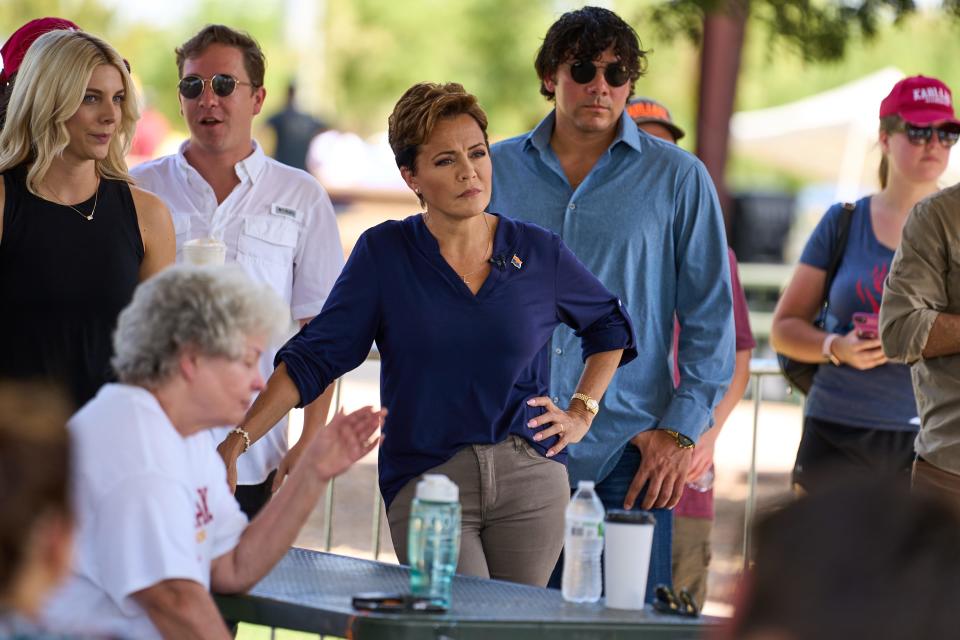
The Arizona Young Republicans would share the same goal as Turning Point USA: engaging young people. Now, though, it would have an official chapter of a national Republican organization.
Among the members of its advisory board would be Bowyer and Hoffman.
And it would join Turning Point on its mission in 2021: recruit people to become precinct committeemen within the Arizona Republican Party, taking it over from the bottom up.
Dan Schultz of Tempe had been on a one-man crusade to get his Republicans who aligned with his brand of conservativism to become precinct committeeman, the foot soldiers in the political party. Schultz discovered that many of those positions sat vacant.
Schultz figured that if enough like-minded people took up the seats, they would overpower the moderates and effectively change the Republican Party from within.
Schultz started this quest in 2008, recruiting members of the Tea Party to become precinct committeemen, he said during a February 2020 online interview for the website of Robert David Steele, a former CIA officer turned conspiracy theorist.
But, Schultz said, the need to fill the precinct committeemen spots with true conservatives became more urgent as Trump ran for reelection. Schultz said, during the online interview, that in 2016, "some of the people in the party, at the highest levels of our Arizona GOP and at the county levels, were actually working against President Trump.”
Schultz said the precinct committee positions needed to be filled in order to "Trumpify" the party.
Schultz, who did not return a call from The Republic requesting an interview, would eventually see his plan amplified by some of the biggest figures in Trump world.
In February 2021, Schultz appeared on "War Room," the talk show hosted by Trump adviser Steve Bannon. Another guest sitting in was Mike Lindell, the chairman of My Pillow, and a high-profile fixture at Trump events.
After Schultz laid out his plan, Bannon encouraged "the unwashed masses in the MAGA movement, the deplorables" to become precinct committeemen.
Schultz would appear more times on Bannon's show and become a guest on other conservative shows, some of which, according to ProPublica, dabbled in conspiracy theories, including QAnon.
By March 2021, Turning Point Action posted a form on its website and encouraged people to become precinct committeemen. By July 2021, Turning Point Action said on its website that recruiting precinct committeemen was "the forefront of its mission." Its website listed detailed information for all 50 states on how to become a precinct committeeman, but only for the Republican Party.
When people filled out forms, they would go to their party's district chair for consideration.
Some of the handwriting on those nomination forms were hard for Kathy Petsas, the chair of her legislative district, to read.
She would later find out why: The forms were filled out while using a person’s back as a writing table.
Many came from rallies where Turning Point Action had a presence, Petsas would discover. A large batch came from a Turning Point Student Action Summit in July 2021 at a performing arts hall in downtown Phoenix where Trump spoke.
The precinct committeeman position is considered the grunt soldier of the party. They are supposed to work neighborhoods, knocking on doors and rallying voters. Although some older or high-profile precinct committeemen — the governor, for example — might be exempted from wearing out shoe leather.
Still, at minimum, each should be a good, loyal Republican. At least that’s what Petsas thought.
Which is why, when she started getting a flood of new applicants for precinct committee positions, she checked them against the voter database provided to her by the Arizona Republican Party.
She found a good number of them had scant voting histories. Some were new Republicans. Some were not even registered as Republicans.
Petsas met for coffee with more than 100 potential precinct committee applicants. Some told her all about the voter irregularities in 2020. Some of those people, she knew, were new to voting.
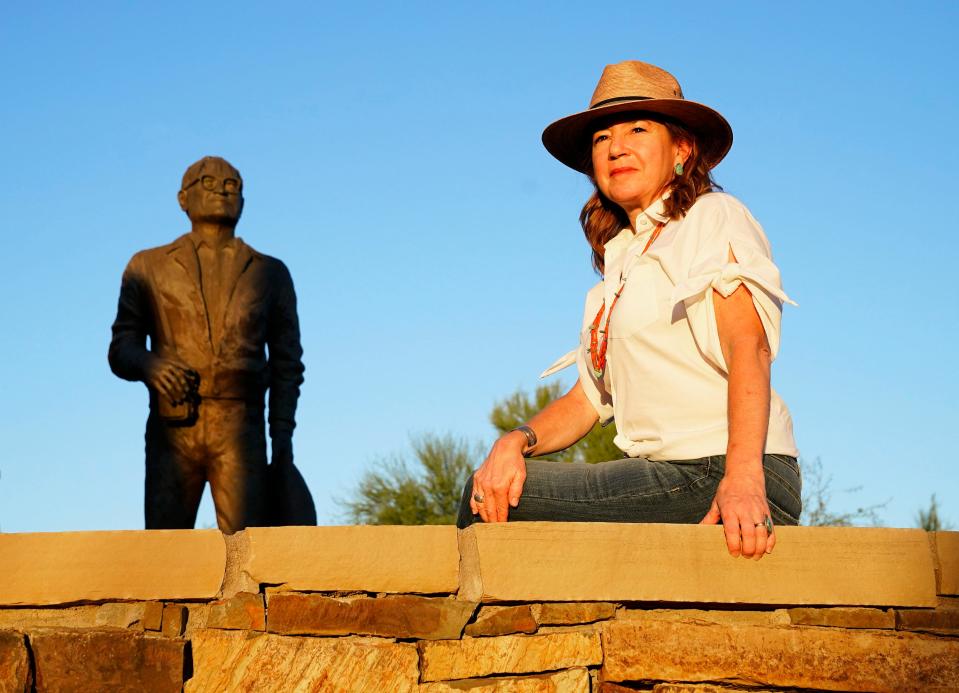
With a signature, Petsas could have made these applicants precinct committeemen. But, she decided not to.
“I’m not going to appoint people who don’t vote,” Petsas said.
Some whom Petsas wouldn't appoint went around her and got appointed by the county's party chair, a Trump acolyte named Mickie Niland who had just been elected to that spot.
Petsas said she talked to other district chairs who told her they approved every applicant who came in.
She was aghast that they did so without backgrounding each one.
And she knew the result: The party was being filled with precinct committeemen who fit the Turning Point brand of Republican.
'Civil war': Arizona GOP divided
In late February 2022, Trump sent a statement to his supporters endorsing the precinct strategy. "If members of our Great movement start getting involved (that means YOU becoming a precinct committeeman for your voting precinct), we can take back our great Country from the ground up," he wrote.
But, that week, the Arizona Legislature would throw a wrinkle into the plan.
Lawmakers passed a bill in lightning quick fashion that attempted to deal with a problem created by new precinct and district maps. What lawmakers focused on, during the few minutes of floor debate, were on the relaxed signature requirements for candidates.
But also included in the bill was a procedure that upended elections for precinct committeemen. The hastily-drafted language was confusing. But its intent was that precinct committeemen not be elected, but instead appointed by the chair of each county’s Republican Party. The statute said that appointed committee people would be treated as if they had been elected.
Once the bill was passed, lawmakers started hearing from Republicans upset that the elections for the precinct committeemen seats were cancelled.
The next week, Republican lawmakers pushed through a repeal, restoring the precinct committeemen elections. Democrats did not support the measure, saying that whether the positions were appointed or elected was of no concern to members of their party.
Leaving behind establishment conservatism: How Turning Point's gathering in Phoenix seeks to shift politics to the right
But it was of concern to Republicans. More than a dozen testified in person about the bill. One, Dan Farley, the chair of Legislative District 4, said that all lawmakers should support the repeal.
“If you do not, you don’t stand for a representative government,” Farley said. “You stand for tyranny and the world will know.”
Bowyer, on Twitter, spun theories about how this was a part of a plan to introduce ranked choice voting, a system that lets voters rank their preferred candidates in a race. It is designed to eliminate runoff elections, but has been pilloried by Republicans as a way to silence their voices.
In a March 4 tweet, Bowyer also said that the bill gave recorders a “hall pass from verifying Precinct challenges…”
And, there would be challenges.
Starting in April, 23 challenges were filed against signatures of precinct committee nominees in a handful of precincts. The challenges were concentrated in eight precincts in the tony areas of Paradise Valley, Scottsdale and Arcadia. In short, in McCain country.
Cory Mishkin had been working on converting a man for years. He was the husband of a Republican precinct committee person but was a registered Democrat.
Sometime in 2022, Mishkin asked him again: “Why are you a Democrat? You seem to agree with what I think.”
The man went on a tirade, Mishkin said, that in effect said he didn’t trust the Democratic Party anymore.
Mishkin told him he ought to just switch. And the man agreed. Mishkin helped him register as a Republican.
That meant this man was able to sign petitions Mishkin had put together to nominate precinct committee people in his district.
Mishkin had always worked to keep the committee spots in his precinct full. That meant he had to find people to fill the spots.
Mishkin said he has long tried to make it easy on his precinct committee nominees. He fills out the paperwork for them, leaving them only the signature to fill in. He then organizes gatherings where the nominees can gather and quickly get the required signatures.
The requirement is not daunting: 10 signatures is all. The formula, followed by a few district chairs: Invite 10 people over to a house. Set out some finger foods and open a bottle of wine. Have the 10 Republicans sign every nominated person’s petition.
Mishkin’s newly minted Republican friend was one of the 10 on each of the petitions signed that day.
Which wasn’t a problem. Until a portion of the party decided to challenge Mishkin’s signatures.
The lawsuit asserted that Mishkin’s friend was still a registered Democrat. Mishkin figured the person who filed was going off an old roster.
The case would be easily dismissed, he figured. But, he hired an attorney, Chornenky, the former Maricopa County party chair, to make sure.
The attorneys for the plaintiffs all came from the firm Wilenchik and Bartness, which had done extensive legal work for the Arizona Republican Party regarding the 2020 election.
Chornenky gave the Republican Party attorney, Jack Wilenchik, a copy of the person’s registration as a Republican. Mishkin said he figured that would lead to the case being dropped. But, the party pressed ahead.
Chornenky said that challenges to a precinct committee post were expensive. At the time, the filing fee for a pleading alone was $250, she said. By that calculation, the 23 cases cost more than $5,750 just on the paperwork. Not to mention fees and the attorney costs.
All for a low-level volunteer position in the party.
"It's hardly worth it," she said. "It's costly, and nobody's going to pay.
She stopped herself. "Well, obviously, somebody did," she said.
Wilenchik, reached by phone, said he would not be able to say who paid him.
One of the lawsuits was filed against George and Susan Stravos, a retired couple whom Petsas had recruited to fill open spots in the Clearwater precinct, Susan Stravos said.
The lawsuit contended that a registered Libertarian was among the 10 signatures the Stravoses collected.
Susan Stravos said she and her husband didn’t contest the lawsuit. If a Libertarian signed their form, she said, that was that and wasn’t worth fighting. “We had bigger fish to fry,” she said.
Susan Stravos said she and her husband felt politically homeless. She has soured on politics and was starting to tune out of current events.
George Stravos and the couple’s oldest son were both graduates of Creighton University, Susan Stravos said, and George Stravos played a role in that university setting up a campus in central Phoenix.
The couple has decided to focus more on its doing medical missions in Mexico. “I like to now spend my time where I can make a difference,” Susan Stravos said. “Serving the underserved in Mexico seems to be the most productive.”
Vicki Vaughn, the woman who was listed as the plaintiff in the lawsuit, said she agreed to take part in the lawsuit because “we’re just trying to keep things on the up and up.”
Vaughn, during a brief phone interview, referred questions about the lawsuit to Dan Farley, the chair of Legislative District 4. Farley did not return messages seeking comment.
Vaughn said she wasn’t aware who paid for the attorney and said she didn’t know there was actually an attorney involved.
Another plaintiff, Linda Rizzo, who challenged three precinct committee nominees in the Dreyfus precinct, said she later learned that her cases were based on a faulty premise. "We found out the file they were using was outdated and the challenges were not valid," she said.
Rizzo said she did not pay the attorney, David Bauer, of Wilenchik and Bartness, who filed the claims, and did not know who did. She said she didn't want to say how she was recruited to be the plaintiff in the lawsuits.
"I'm not really comfortable talking about all this to be honest with you," she said.
Kyle Rittenhouse: Teenager acquitted of killing two people, wounding a third at Wisconsin protest speaks at Turning Point USA Phoenix conference
Of the other six plaintiffs who filed precinct committee signature challenges, one refused comment. The others either couldn't be reached or didn't return requests for an interview.
At legislative district meetings since, the atmosphere has remained “cantankerous,” Mishkin said.
Some of the people who won their court challenges and went on to win election to a precinct committeeman seat are staying away from the meetings, Mishkin said.
“Even though they won,” he said, “they just don’t feel welcome.”
Same with some of the old guard Republicans who weren’t challenged, but simply feel out of place, he said.
“It’s just a good old-fashioned civil war inside the party,” Mishkin said.
With a slew of new precinct committee people appointed by the county and not by Petsas, Petsas became the target of a vote to oust her as district chair.
She had decided not to run for the position again anyway. But, the precinct committee people wanted to make sure she was out.
'A whole different demeanor'
Ward has been one of the more high-profile party leaders. But, Petsas said, the position used to be more influential.
Petsas said previous chairs exercised power behind the scenes, directing people to seek certain offices, dissuading others from crowding the field. The aim, she said, was winning elections.
“How are we going to build this?” she said previous chairs asked. “How are we going to continue to win?”
Focusing on continued winning for the party meant that there was a spirit of cooperation. It was a spirit that didn’t attack a fellow Republican for seeing issues differently, which is happening now under the Turning Point era, she said.
She mentioned Republicans from Arizona who were national figures: John “Jay” Rhodes, Sandra Day O’Connor, John McCain, Jon Kyl, Jeff Flake. Each unique, but each Republican.
“It’s a whole different demeanor of person,” she said. “A whole different caliber.”
This article originally appeared on USA TODAY NETWORK: Trump Republicans seized Arizona's GOP with help of Turning Point USA

